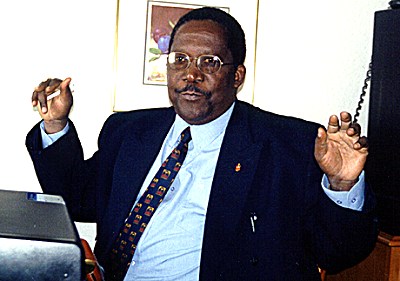General Board of Global Ministries
![]()
UM Information
UM
Reporter
![]()
Florida Southern College
![]()
Bethune
Cookman College
![]()
FL UM Children's Home
![]()
|
|
Bishop not asking for charity for Mozambique |
 |
Photo by Michael Wacht |
| Bishop Joćo Somane Machado of the Mozambique (Africa) Area of the United Methodist Church says he has to put church in quotation marks because a "church" in Mozambique is often a patch of dirt under a tree where people meet for worship. "You will see joyful people in the 'church,' " he said. "You can see joy, the face smiling with almost nothing, but they are full." |
| By Michael Wacht ORLANDO — Bishop Joćo Somane Machado of the Mozambique (Africa) Area of the United Methodist Church says he believes the Florida and Mozambique conferences can benefit from each other. Both conferences are considering becoming partners. "In my perspective, I will not be happy if you try to send money only to Mozambique," he said. "It’s not a good relationship. I’m not here to ask for charity. I came to ask for sharing as one church." Machado visited conference churches, the Florida United Methodist Children’s Home and Bethune-Cookman College May 11-14. His trip to Florida was part of the process of exploring a partnership in ministry between the Florida and Mozambique conferences through the Council of Bishops’ Initiative on Children and Poverty and Hope for the Children of Africa. The two conferences are working together to build the Bishop Cornelius L. and Dorothye Henderson Secondary School in Muxungue, Mozambique, and are discussing ways to further develop the relationship. Machado said the Henderson school "can be just the cornerstone of our relationship, the foundation." He said it, and others like it, are needed to educate the nation’s children. In some areas of Mozambique, schools are 150 miles apart, and children cannot begin their education until they are old enough to walk to school. Machado would also like to see an agreement between Florida and Mozambique include provisions for at least one student each year to attend Bethune-Cookman or Florida Southern College. The educational opportunities in Florida would be "so powerful" for Mozambique, he said. "Africa is not a poor continent. It has all the resources to be a powerful continent…but we don’t have people with the skills to develop all these resources." Mozambique needs to train leaders for its rapidly-growing United Methodist Church, which has experienced an increase from 10,000 members in 1988 to more than 250,000 today, Machado said. "We have a big country and we need to train lay leadership in evangelism," he said Machado said Mozambique’s pastors are often assigned to seven-, 12- or 15-point charges and must walk as many as 10 miles between churches. They often spend up to two weeks away from home while they travel to their churches to preach, teach, and perform baptisms and weddings. Those churches are not like churches in the Florida Conference, according to Machado. People in Mozambique often worship under trees, sitting on the ground or rough benches. Machado said he would like to see Mozambique and Florida develop a pastor exchange program with pastors from each conference spending three months at a parish in the other conference, working with and learning from a pastor there. He said he believed many of Florida’s pastors would find it difficult to live for three months with no washing machine, microwave ovens or telephones in places where water and electricity are luxuries. He would also like to see both conferences exchange Volunteers in Mission (VIM) teams. He said visiting Mozambique can change "your perspective of Christianity, of life." "You go there, you’ll come not the same person," Machado said. "I’ve seen churches here doing everything to themselves, trying to make everything comfortable for themselves. Over there, they will see joyful people in the ‘church,’ which is not a church as you understand it. You can see the joy, the face smiling, people with almost nothing and yet full." Machado said teams from Mozambique also have something to share. "People might ask, ‘What can they do here? We have everything,’ " he said. "But the Troy Conference in New York was surprised at how their annual conference was changed with a team there itinerating." Machado says he believes the church can be a unifying force, despite the differences between Florida and Mozambique. "You really know that we are one church as the United Methodist Church—connectional and worldwide," he said. "Mozambique and Florida, I believe we have so many things we can share." Top
of this page |
